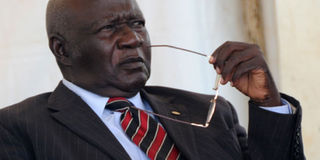In death, Njuba stings Museveni

The late Sam Kalega Njuba was the first Member of Parliament for Kyadondo East. He was in office from 1996 to 2001, then returned for the 2006-11 term.
What you need to know:
Njuba says some accounts of the struggle have attempted to project the struggle as an effort only won by those who were in the wilderness, forgetting or ignoring vital roles of several people who did not go to the bush.
Former Minister for Constitutional Affairs and secretary of the external wing of the NRM/A Sam Kalega Njuba, who passed on in December levelled some of the most scathing criticism so far on President Yoweri Museveni.
In a new book released just after he died titled; The Betrayal: As Ugandans are Taken for a Ride Again, Mr Njuba describes the President as an “insincere” sly man who would do anything to get what he wants despite the cost and effect on others.
The 320-page book is largely an account of the work of the external wing to correct what Mr Njuba describes as “criminal and unforgivable perversion of some vital facts in a bid to play heroism,” in the NRM/A struggle of 1981 to 86 that brought President Museveni to power. That struggle marked 28 years in power on January 26.
Njuba says some accounts of the struggle have attempted to project the struggle as an effort only won by those who were in the wilderness, forgetting or ignoring vital roles of several people who did not go to the bush.
A detailed and candid account of a man who was very close to the inner circle, Njuba’s book is bound to raise new debate, especially given the fact that his wife, Gertrude, fought in the bush and continued working closely with Museveni years after the two men fell out. At the time of his death, Njuba, who was dropped from Cabinet in 1994, was chairman of the FDC party.
Njuba questions Museveni’s claim to the socialist/Marxist political ideology, noting that he only used it as a cover to achieve power.
“Museveni, just until recently, had cut the posture of a socialist. Indeed, many political analysts referred to him as a self-confessed Marxist. He was viewed as anti-western, he frequented China and learnt some of his guerrilla tactics from Mozambique,” he notes on page 188.
Njuba, who says Ugandans have been consistently betrayed by leaders they expected a lot from, warns that “Ugandans will never forgive Museveni”.
He recounts not less than three incidents when he felt betrayed by Museveni, including launching the 1981 war without alerting him so he could take cover, but acknowledges that after the war started, Museveni sent for him. He says the second feeling of betrayal was when the President appointed Gertrude as Special District Commissioner without either consulting or regard to the fact that the family had been separated for long.
‘He who appoints, disappoints’
Chapter 14, sub headed, “In the government of Yoweri Museveni; he who appoints, disappoints” Njuba presents Museveni as a distrusting, dictatorial man who takes decisions without consulting even people assumed to be very close or those who should be in the know.
“The title of this chapter is literally accurate and true to the letter. It was his government in the real sense of the word. Nobody really sought to question the choice of the ministers as they were announced, because everybody believed in Museveni and trusted he practiced what he all along preached – wide consultations.
In fact, if he did consult someone before any appointments it was a very small inner circle... It did not include NRM Vice Chairman Moses Kigongo, nor then premier Samson Kisekka. Both leaders heard the appointments over the radio,” Njuba writes of his appointment as minister in 1986.
The book details the recruitment and frustration of key players like the late James Wapakabulo (a former Speaker of Parliament and minister) whom he says distrusted Museveni.
It carries revealing anecdotes on top individuals in the NRM and government both present and future, especially those who belonged to the external wing such as Amama Mbabazi, Mathew Rukikaire, Eriya Kategaya and Dr Ruhakana Rugunda.
Worth noting are detailed accounts of the Uganda regimes and roles of former presidents Yusuf Lule (who was removed from power in June 1979 after only 60 days by the Military Commission where Museveni was vice chairman), Godfrey Binaisa, Obote and Amin.
Though strong on content, the book is littered with typographic errors and some of the accounts appear to be direct extracts from his diary entries and show little effort to change the present tense in which they were entered into past tense for today’s reader.




